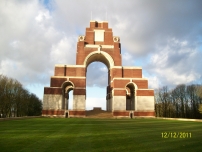| First Name: | Albert Victor | Last Name: | BURNS | |
|---|---|---|---|---|
| Date of Death: | 01/07/1916 | Lived/Born In: | Queens Park | |
| Rank: | Private | Unit: | London13 | |
| Memorial Site: | Thiepval Memorial | |||
Current Information:Age-23 3, Esmond Road, Queens Partk
The opening day of the Battle of the Somme 1st July 1916 This was a disastrous day for the British Army in France. Eleven divisions of Fourth Army attacked along a 15 mile front from Maricourt to Serre. Two further divisions of Third Army launched a diversionary attack just to the north of Serre at Gommecourt. For a week beforehand the British artillery pounded the German trenches but the Germans had been there for a long time and they had constructed deep, concrete reinforced shelters beneath their trenches and many survived the bombardment. The troops went over the top at 7.30am but even before they had left their overcrowded trenches, many had been killed or maimed by German artillery. The Germans knew that they were coming. Once in No-Man’s-Land the artillery continued to take its toll and then the machine guns opened up on the advancing British infantry. They fell in their thousands and the attack came to a standstill almost everywhere. Survivors sought cover wherever they could find it and at night they crawled back to their own lines, often dragging a wounded soldier with them. Only in the south were any advances made with the attack on Fricourt and Mametz. Over 19,000 British soldiers were killed on this day, including 2,500 from London. The attack on Gommecourt The 56th (London) Division and the 46th (North Midland) Division carried out the diversionary attack on Gommecourt. It was intended to draw German reserves away from the main battle further south and to pinch out the Gommecourt salient. It failed on both counts. The German defences at Gommecourt were among the strongest any British attack faced on 1st July. Nevertheless 56th Division’s attack on the southern edge of the salient began promisingly. The first two German lines were taken but they could get no further. 46th Division’s attack came to grief on the uncut wire and by the end of a very bloody day, all but the dead and injured were back in their own trenches. On 1st July, 1916, the 12th and 14th London battalions led the attack by 168 Brigade, 56th Division, with 13th London and 4th London in support. With no progress made by the 46th Division on the left, the entire weight of the very strong German defences was concentrated on the 56th Division and although some inroads were made into the German front lines by the two leading battalions, it proved largely impossible for 13th London to reinforce or re-supply these troops. No-Man’s-Land and the British front line trenches were plastered by shell fire and swept by machine gun fire and many men of 13th London were killed either in their own front line or in No-Man’s-Land. Despite this at 9am, half a company of 13th London did manage to make it across to bolster 14th London but they were the last reinforcements to so do. The battalion ended the day with 320 casualties and back in their own lines. One of these many casualties suffered by 13th London was Albert Burns.
|
||||
| « Back to Search Results | ||||
| If you think any of the information shown here is incorrect, Click Here to submit your amends and comments | ||||




